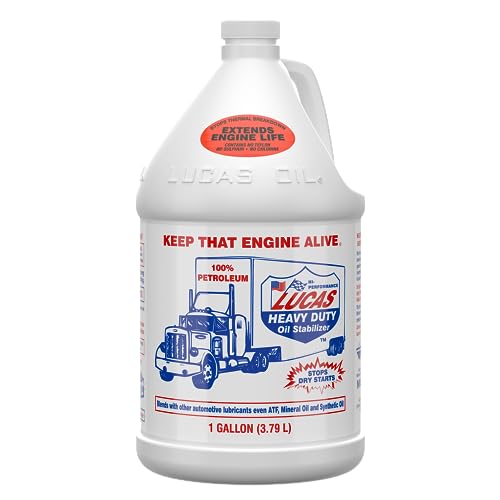TOP PICKS
BUYING GUIDE
Oil stabilizers are additives designed to enhance the performance and longevity of your engine’s oil. They work by improving the oil’s viscosity, reducing friction, and providing better lubrication, especially under high temperatures and heavy loads. These stabilizers can be particularly beneficial for older engines, helping to prevent oil breakdown and reduce noise and wear. Choosing the right oil stabilizer involves understanding your vehicle’s specific needs, the effectiveness of different formulations, and how they can extend the life of your engine. This guide will help you navigate these considerations to find the best oil stabilizer for your vehicle.
Key Features to Consider
Compatibility and Engine Type
- Engine Compatibility: Ensure that the stabilizer is appropriate for your type of engine, whether it’s gasoline, diesel, or a high-performance engine. Some stabilizers are specifically formulated for particular engine types and may not be suitable for others.
- Oil Compatibility: Check whether the stabilizer can be mixed with the type of oil you are using, including conventional, synthetic, or a blend.
Performance and Benefits
- Viscosity Improvement: Look for oil stabilizers that enhance the oil’s viscosity, especially in older engines or in extreme temperature conditions, to ensure better lubrication and protection.
- Wear Reduction: Choose stabilizers known to reduce engine wear and tear. These can help extend the engine’s lifespan and improve overall performance.
- Thermal Stability: Consider stabilizers that enhance the oil’s ability to resist thermal breakdown, particularly important in hot climates or in vehicles that undergo heavy use.
Application and Use
- Ease of Use: Most oil stabilizers are designed to be added directly to your engine oil, making them easy to use. Check for any specific mixing instructions or application requirements.
- Dosage and Treatment Frequency: Understand how much product is needed per volume of oil and how often it needs to be added. Some stabilizers may require addition at every oil change, while others might have different intervals.
Environmental and Health Impact
- Eco-Friendliness: Prefer products that are environmentally friendly and do not contain harmful chemicals that could damage the environment if leaked or disposed of improperly.
- Safety Features: Ensure that the product is safe to handle, with minimal toxic or hazardous ingredients, particularly if you will be applying it yourself.
Pros and Cons
| Pros of Oil Stabilizers | Cons of Oil Stabilizers |
|---|---|
| ✔️ Enhances oil performance and extends oil life | ❌ May not be necessary for newer, well-maintained engines |
| ✔️ Reduces engine noise and increases stability | ❌ Some products might be incompatible with certain oil types |
| ✔️ Helps older or high-mileage engines run smoother | ❌ Incorrect usage can lead to issues like oil overfill or improper mix |
| ✔️ Provides better lubrication under extreme conditions | ❌ Costs additional money and requires regular monitoring and maintenance |
Quick Tips
- Read Product Reviews: Gain insights from user experiences to understand how different stabilizers perform in real-world conditions.
- Consult Your Mechanic: If unsure about whether you need an oil stabilizer, or which product to use, consult with a professional mechanic.
- Monitor Engine Performance: After adding a stabilizer, keep an eye on your engine’s performance and oil levels to ensure that the additive is having the desired effect.
Selecting the right oil stabilizer involves assessing the needs of your engine, the quality and compatibility of the additive, and the potential benefits it can offer. By carefully evaluating these factors, you can choose a stabilizer that not only prolongs the life of your engine oil but also enhances your vehicle’s performance and efficiency. Regular use of a high-quality oil stabilizer is a proactive step towards maintaining your engine in optimal condition, especially for older or high-mileage vehicles.











